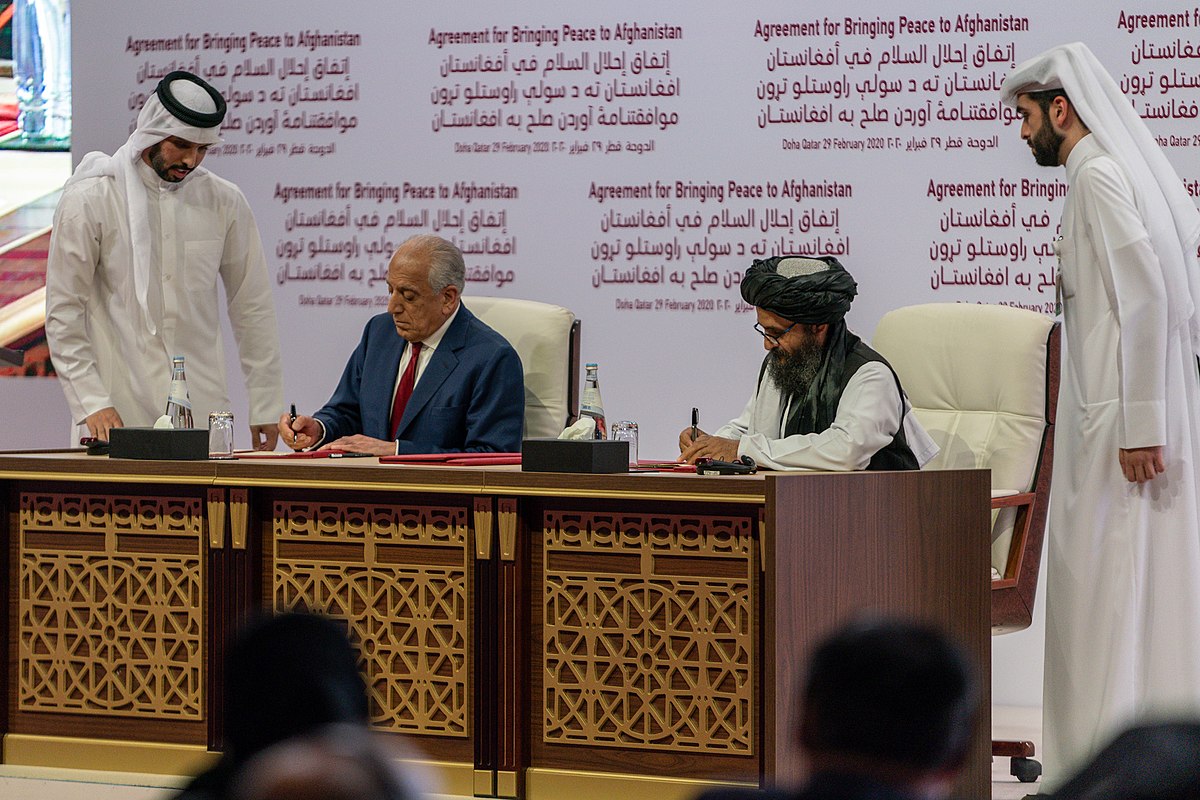 Public Domain. Signing of US-Taliban Peace Agreement 2020
Public Domain. Signing of US-Taliban Peace Agreement 2020
The Afghan Peace Deal and the Biden Transition
The Afghan peace process has been a difficult pursuit with various points of potential decay, the reneging of pre-negotiated terms, and geopolitical shifts which threaten to undermine the creation of a working deal. The pursuit of peace through this process is still a worthy goal, but in order for the U.S. to maintain its credibility in this and future negotiations, it should not ignore blatant violations of the process. As the U.S. is set to transition presidential administrations, the precocious elements of the Afghan Peace Deal could continue its trajectory into further uncertainty.
Peace Negotiation Background
Following a U.S.-Taliban agreement and U.S.-Afghanistan Joint Declaration on February 29, 2020, a peaceful conclusion to the 19-year-old war in Afghanistan seemed within reach. However, various negotiation stalemates have undermined such optimism.
Despite subtle differences, the general agreement outlines were similar:
- Prevent armed groups from using Afghanistan as a base for acts against the U.S. and its allies. Al-Qaeda and the Islamic State Khorasan Province (ISKP) were specifically mentioned by the Afghan government.
- The withdrawal of all foreign troops (including U.S. and coalition forces) within 14 months of the agreements.
- Establish negotiations between the Afghan government and the Taliban – dependent on a large-scale prisoner exchange.
- Establish a permanent and comprehensive cease-fire and political roadmap for the future of Afghanistan.
The speedy timetable outlined by the U.S.-Taliban agreement, which notionally set the intra-Afghan peace negotiations to begin on March 10, 2020, stalled because of the precondition of a large-scale prisoner swap. The precondition was set by the U.S. as a confidence-building measure but was offered without prior agreement from the Afghan government. Intra-Afghan negotiations did not restart until the full prisoner exchange finally occurred in August.
Peace talks later commenced on September 12, 2020, but again stalled due to procedural matters regarding what law would be used to resolve conflicts that arose during talks going forward. In December, the Afghan government and Taliban agreed to have Islamic laws and teachings guide them throughout peace talks, which increased the chances of substantive negotiations. Further negotiations are scheduled for January, 2021.
Trouble with the Taliban
The Taliban’s ability to endure the 19-year war following their overthrow in 2001 has repositioned them as a major political player in the country should the negotiations succeed. However, despite holding significant bargaining power throughout negotiations, their inability to adhere to agreement terms and their propensity to escalate violence may ultimately undermine the deal.
The Taliban’s continued commitment to the terms is a major caveat to the peace process. However, even the primary precondition (the prevention of groups using Afghanistan as a base for acts against the U.S. and its allies) has not been met as the Taliban has maintained its ties with al-Qaeda. A UN report in May even indicated that al-Qaeda is “quietly gaining strength in Afghanistan while continuing to operate with the Taliban under their protection.” Additionally, the increased violence during negotiations further complicates the integrity of the peace process.
U.S. Administration Transition
The Trump administration’s approach through the early phases of the Afghan peace process had been enthusiastic and optimistic, as they believed it would culminate in a swift end to the U.S.’ longest ever overseas military intervention. However, as the peace process progressed, the administration’s role has been marked by reactionary impatience and unpredictability. Most notably was President Trump’s sudden order to reduce U.S. troop presence in Afghanistan to 2,500 by January 2021. This decision has made prospects of a peace deal even more uncertain as the Afghan government fears such a withdrawal could embolden a Taliban power grab.
One of the largest points of contention when it comes to the rapid pullout of U.S. forces is that it essentially gifts the Taliban one of their most important goals (the complete removal of U.S. troops from Afghanistan) without holding them to task for preconditional terms. This seemingly undermines the peace process as the incentives for the Taliban to decrease violence and reach a comprehensive and permanent cease-fire begin to lose value.
The incoming Biden administration will step into an already messy situation in Afghanistan only further exacerbated by the departing administration’s rushed exit strategy. Biden has not yet indicated whether his administration will proceed with the drawdown, but he has indicated that he prefers to maintain a small U.S. military footprint with a counterterrorism focus. The big question is whether they are willing to draw a line and do what the Trump administration was unable or unwilling to do: hold the Taliban accountable. If the U.S. doesn’t commit to maintaining the integrity of the peace deal preconditions, then the process will likely continue at its shambled, foot-dragging pace, which could allow the Taliban to reach its objectives by brute force, further implicating U.S. and Afghan security.





